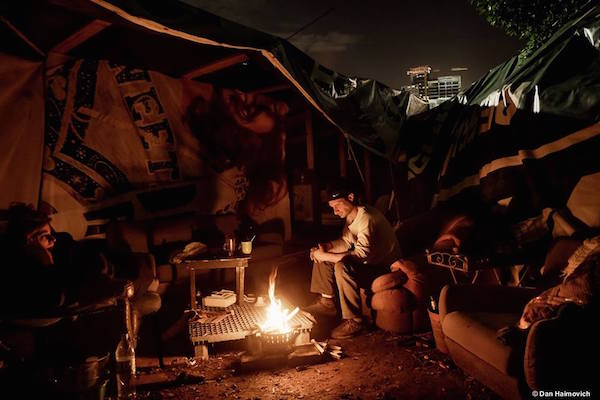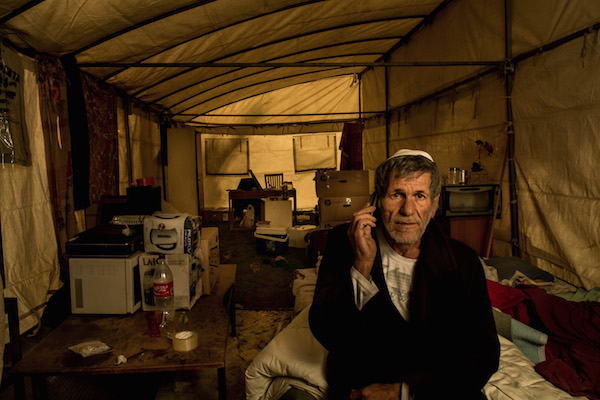The encampment has been home to some 50 people for two years. A court had ordered the installation of electricity, which the city says has been used illegally.
By Avi Blecherman

The Tel Aviv-Jaffa Municipality on Wednesday cut off electricity to one of the city’s largest homeless encampments one day before the arrival of what is expected to be a heavy winter storm. The city claims the electricity connection was illegally installed.
As the result of a court order, a generator caravan was recently installed in the camp near the city’s Arlozorov train station, providing enough electricity to charge cellular phones, power refrigerators and electric kettles. A guard is posted outside the generator most of the day.
According to the Arlozorov camp’s residents, they didn’t make any illegal connections to the generator caravan, adding that they have taken care to guard it themselves.

The illegal connections, the residents say, were made by others, explaining that there is a family of Iraqi refugees and Palestinian laborers who also live in the same park.
The bottom line, however, is that when the storm arrives on Thursday residents of the encampment will be without electricity. At the time of writing, they said a nearby bomb shelter — in which the city allowed them to take shelter during the previous storm — was shuttered.
Responding to the removal of the electricity, Tel Aviv-Jaffa city councilwoman Shelly Dvir wrote to municipal deputy director-general Rubi Zluf:
I am writing to you regarding the electricity connection in Arlozorov [camp]. According to the camp’s residents, the municipal inspector can attest to the fact that the people in the camp did not make illegal [electricity] connections, and are diligent about the matter. According to them, the family from Iraq, which is under the care of the welfare authorities, made the illegal connection. Either way, very cold weather is expected starting tonight. I would appreciate if you issued an order to reconnect the electricity this morning and to open the shelter on Dafna [St.], which is currently locked and they don’t have keys. Thank you in advance for your attention. Shelly.
Dvir was told that the matter was being taken care of, and members of the Antifa group received the following response from the city:
Regarding the matter of electricity — the municipality has continuously worked to allow the residents of the park to be there, despite the fact that a public park cannot be a residence. Within that framework, the municipality installed perimeter lighting in the park, provided chemical toilets, distributed tents, provided social workers to the residents and more. On the matter of electricity, following repeated break-ins to the electricity panel in the park by its residents, which was a life-threatening situation, the Electric Company disconnected the electricity supply to the electric panel. Despite the municipality’s earnest attempts to find a solution for matter, according to the position of the Electric Company and other electricity experts, it was decided to halt the life-threatening provision of electricity to the park. However, the municipality accepted the court’s order and will act accordingly.
The camp was established in June 2012 during massive social demonstrations as a protest tent, with the approval of Mayor Ran Huldai. For over two years some 50 people, most of them homeless people of various ages. With all of its difficulties, the encampment enables its residents to have a space of their own, with relative security and a place to store their belongings.
The camp is a last chance of sorts for a relatively safe life and cutting off electricity may seal its residents fate. Some of the residents came there as part of a social struggle, but for others it is the only place they can sleep with quiet and security.
This article was first published on +972’s Hebrew-language sister site, Local Call. Read it in Hebrew here.
Related:
The storm that only affects Jews
Archive: Ahead of winter storm, IDF razes Palestinian homes

